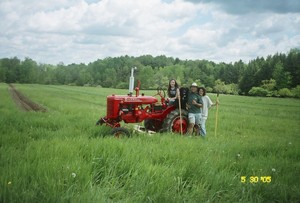04 Apr Mon 2011
"The Six Week Want"
The Six Week Want
A few years ago, I remember listening to a particular podcast by author James Howard Kunstler. http://www.kunstlercast.com
That was the first time I ever heard the name of "The Six Week Want."
You can listen to that episode here if you are so inclined . . .
http://www.kunstlercast.com/shows/KunstlerCast_82_Food_in_World_Made_By_Hand.htmlI was thinking about this last week when we finished up the last of our winter squash, and over the weekend, a few of my friends were going out ramp hunting, and going trout fishing.
We, here in the North-East United States are now entering the period of time, that was traditionally known as "The Six Week Want."
People today are blessed with a great abundance of food, from all areas of the world, all the year round.
Spring is generally considered to be a time of renewal and abundance, but it was just the opposite in the early 19th century. It was a very hard time.
After a long hard winter, food was generally scarce in Spring, so there was a time in-between the last of the Fall crops, and before the new Spring crops, and this time was referred to the "Six Week Want."
Nothing was growing in the garden yet, and they were getting to the bottom of the saurkraut or apple barrel. Last year’s supplies of meat and vegetables were all gone. To get fresh greens in their diet, they harvested wild leeks (ramps), pokeweed, dandelions and maybe even fiddlehead ferns to eat.
Even firewood might've been getting scarce if cold temperatures started early and stayed late (like it did this past season and continues now).
I imagine deer might've been scarce, especially if they had a hard time surviving the winter also.
I guess some wild game was available. Spring Turkey hunting season is coming up soon . . . I saw lots of turkeys recently that could've easily become a meal.On the positive side, Maple sugar and syrup is made in late-Winter/early Spring, and that sure is good to have something sweet to eat.
Springtime in early America also meant fresh eggs for those with chickens. Eggs are definitely a sign of spring (hence Easter Eggs), and with more daylight and longer days, chickens begin laying more eggs. Daylight affects egg production (That’s why modern poultry farms have lights on all the time).
So, if you were dependent on growing your own food, or obtaining it locally, what would you be eating now?
I think I'd be pretty hungry myself!!!

